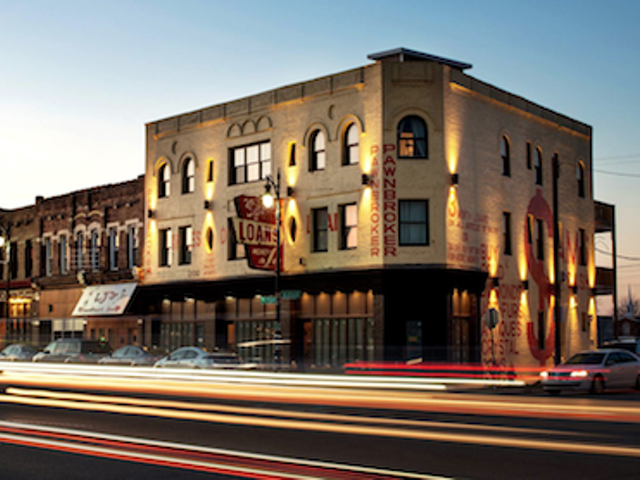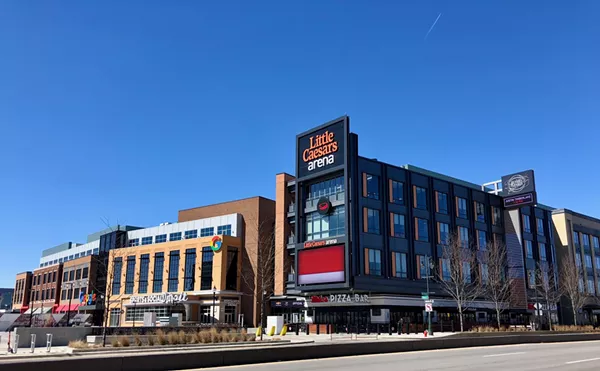
Audio By Carbonatix
[
{
"name": "GPT - Leaderboard - Inline - Content",
"component": "35519556",
"insertPoint": "5th",
"startingPoint": "3",
"requiredCountToDisplay": "3",
"maxInsertions": 100,
"adList": [
{
"adPreset": "LeaderboardInline"
}
]
}
]
It's made the rounds on social media a bit, but a post on Next City from an artist who settled in Detroit bears some further examination. It was by an artist with the formidable name of Sally Jane Kerschen-Sheppard who had lived in the New York area for 17 years. Enticed by tales of Detroit as a place where a struggling artist could own a home and have the free time and money to focus on creative work, she put in a bid on a Detroit home and purchased it.
Then reality set in. Taxes. Car insurance. Home insurance. Picking up trash off the lawn in the morning. In time, Detroit began to look a lot like living on the coasts, except you pay for transportation and the attendant insurance what you would have paid in rent to live in a better functioning city. By the end of the article, our writer's future in Detroit is uncertain.
And with good reason. Though you don't hear it trumpeted throughout the United States, one of the reasons Detroit is the way it is would be because Michiganders are more or less uninterested in seeing it thrive. Problems roll downhill in Michigan, from the people who have means to the people who don't. It's a potent process that means Detroiters pay more for the privilege of living in a place with more crime, more social ills, more blighted properties, and fewer choices. This is no accident; it's a matter of public policy.
Of course, the idea that anyplace in America is a good place to be poor is ridiculous. Given the ever-increasing income inequality in this country, the great squeeze that has millions caught in a vice between lower wages and higher costs of living, there is no safe harbor for those trying to stretch their dollars and find some modicum of security.
But Detroit isn't all it's cracked up to be. As Kerschen-Sheppard points out, her friend owns a similar-sized house in Livonia valued at $325,000, and pays annual property taxes that are the same as her Detroit house valued at $100,000. As we all know in these parts, it's the same story with your car insurance. Detroit, it would seem, is not the ideal place to be poor. Amass a little more money, and you'll do better in one of Detroit's suburbs — at least on paper.
But there are workarounds, for the right type of person, for those willing to be bohemian enough to do it on the cheap. And that's one thing Detroit has produced: an army of young people who know how to get along living an atypical life. It's not for everybody, but for a hardy person who doesn't mind riding a bike all year, there are options. If you can get a mortgage that's low enough, it hardly matters that you're paying more in insurance and taxes than you are in principal and interest; you'd never have had the capital to buy where they're lower. Detroiters can be very kind and forgiving in that amusement and entertainment costs can be negotiated. It takes friends of all different classes to find it,, but we've scored free seats at the opera, paid a pittance for a night of fringe entertainment, and usually get invited to several backyard bonfires a week when the weather is good. Live in the city long enough, and there's that moment when you're given a free drink, waved in by the door guy, or invited to your neighbor's backyard barbecue. What makes Detroit great isn't some magic formula of low home prices and tolerable civic ills: It's the city's people. And what would you do in Livonia? Get a designated driver to chauffeur you over to TGI Fridays?
Like I said, this isn't for everybody, but for the person who's considering moving to Detroit to be a struggling artist, it's important to know just what that struggle might entail. Depending on how conventionally you want to live, Detroit can be one of the more expensive places to be poor. You have to ask yourself what concessions you're willing to make, or to learn from others that they're even possible to make.
Or the city just might break your heart.





